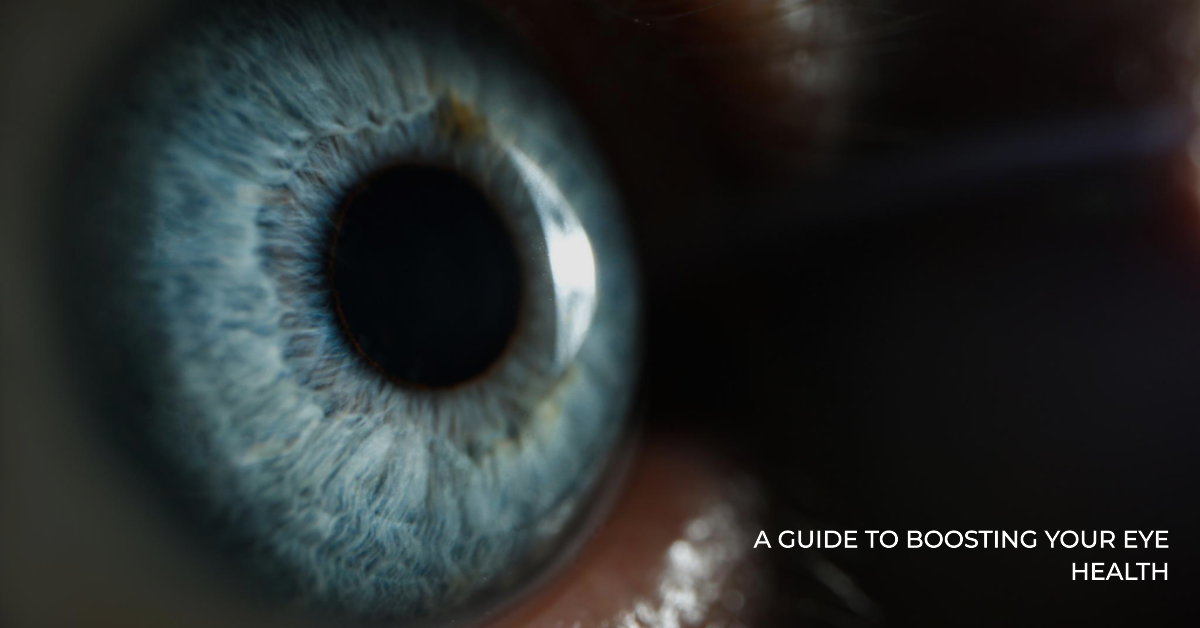Boost Your Eye Health: A Guide to the Best Vitamins
Your eyes are the windows to the world, and caring for them is essential for maintaining clear and sharp vision throughout your life. In this comprehensive guide, we'll explore the best vitamins and nutrients that can help boost your eye health. From vitamin A to omega-3 fatty acids, we'll delve into the science behind these essential components, their sources, and how you can incorporate them into your daily diet to support your vision.

Good vision is a precious gift, and taking care of your eyes is crucial to preserving it. As we age, our eyesight can gradually decline, leading to conditions like macular degeneration, cataracts, and other eye-related issues. However, the good news is that you can take proactive steps to protect and improve your eye health. One of the most effective ways to do so is by ensuring you're getting the right vitamins and nutrients in your diet.
Vitamin A: The Vision Vitamin
Let's start with the superstar of eye health – vitamin A. This essential nutrient is responsible for maintaining good vision, particularly in low-light conditions. It helps form the light-absorbing molecule in your eyes, known as rhodopsin. A deficiency in vitamin A can lead to night blindness and other vision problems.
Sources: Vitamin A can be found in foods like sweet potatoes, carrots, spinach, and liver.
Vitamin C: Antioxidant Protection
Vitamin C, also known as ascorbic acid, is a powerful antioxidant that plays a significant role in maintaining eye health. It helps protect your eyes from oxidative damage caused by free radicals, reducing the risk of cataracts and age-related macular degeneration.
Sources: Citrus fruits, strawberries, bell peppers, and broccoli are rich sources of vitamin C.
Vitamin E: Guarding Against Cataracts
Vitamin E is another potent antioxidant that safeguards your eyes against the development of cataracts. This vitamin can help maintain the health of the cells in your eyes and prevent them from oxidative damage.
Sources: Nuts, seeds, and spinach are good dietary sources of vitamin E.
Omega-3 Fatty Acids: Nourishing Your Retinas
Omega-3 fatty acids, particularly docosahexaenoic acid (DHA) and eicosapentaenoic acid (EPA), are crucial for the health of your retinas. They contribute to the structural integrity of retinal cell membranes and promote proper visual development and function.
Sources: Fatty fish like salmon, mackerel, and flaxseeds are excellent sources of omega-3 fatty acids.
Lutein and Zeaxanthin: Shielding Your Eyes
Lutein and zeaxanthin are carotenoids that act as natural sunglasses for your eyes. They help filter harmful high-energy light waves, such as ultraviolet rays, which can damage your retinas. These nutrients are particularly effective in reducing the risk of macular degeneration and cataracts.
Sources: Leafy green vegetables, corn, and egg yolks contain lutein and zeaxanthin.
Zinc: Essential for Vision
Zinc is a mineral that plays a crucial role in maintaining healthy eyes. It is involved in the metabolism of vitamin A and supports the function of enzymes in your retina. A deficiency in zinc can lead to poor night vision and other eye issues.
Sources: Foods like oysters, beef, and beans are rich in zinc.
A Balanced Diet for Your Eyes
To boost your eye health, it's important to maintain a balanced diet that incorporates these essential vitamins and nutrients. Here's a sample daily meal plan that can help you achieve just that:
-
Breakfast: Start your day with a spinach and tomato omelet. Spinach provides lutein, while tomatoes offer vitamin C.
-
Lunch: Enjoy a salmon salad with mixed greens, incorporating omega-3 fatty acids and antioxidants.
-
Snack: Munch on a handful of mixed nuts for a vitamin E boost.
-
Dinner: Savor a serving of roasted sweet potatoes and carrots to get your dose of vitamin A.
-
Dessert: Treat yourself to a fresh fruit salad with citrus fruits to top up your vitamin C intake.
Conclusion
Incorporating these essential vitamins and nutrients into your daily diet can significantly enhance your eye health and reduce the risk of vision-related issues. Remember that a well-balanced diet not only benefits your eyes but also supports your overall well-being.
So, make a conscious effort to include vitamin A, vitamin C, vitamin E, omega-3 fatty acids, lutein, zeaxanthin, and zinc in your meals. By doing so, you'll be taking a proactive step towards maintaining clear and sharp vision, allowing you to appreciate the beauty of the world for years to come. Your eyes deserve the best care, so let's start today and see the world through healthier, happier eyes.










